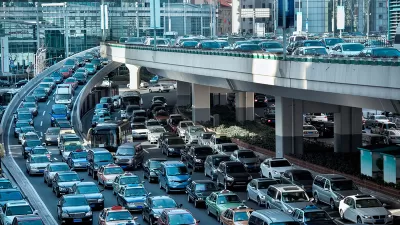According to "boundary theory," a daily commute gives us time to do the emotional work of switching roles and establishing a separation between work and home life.

After a year of working from home, writes Jerry Unseem in The Atlantic, "[m]any people liberated from the commute have experienced a void they can’t quite name." Without the daily trip to and from work, "[t]here are no beginnings or endings. The hero’s journey never happens. The threshold goes uncrossed." Useem questions what role the commute plays beyond getting people to and from work.
"In 1994, an Italian physicist named Cesare Marchetti noted that throughout history, humans have shown a willingness to spend roughly 60 minutes a day in transit," a constant that has held true, for the working class as well as the wealthiest industrialists. Today, the average American one-way commute clocks in at 27 minutes.
Participants in a UC Davis study gave a number of reasons for wanting a short–but not non-existent–commute: "the feeling of control in one’s own car; the time to plan, to decompress, to make calls, to listen to audiobooks." According to Gail Sheehy and a body of research known as boundary theory, "[y]ou get a very strong feeling of two lives with the train a bridge." The commute "is actually a relatively efficient way of simultaneously facilitating a physical and psychological shift between roles."
Useem recommends a set of habits that can help us set boundaries when working from home. Clothing, he writes, can make a big difference in your focus. "In office attire, you can’t take out the trash or water the lawn without a strong feeling that you ought to be doing something else. Like your job." He cites other examples from corporate-ritual designer Ezra Bookman, such as "lighting variations, warm-up stretches, cellphone-free walks, and, as he demonstrated to me over Zoom, shrouding your computer in a fine blue cloth when you log off, as if it, too, needs a good night’s sleep."
Ultimately, Useem says, creating new rituals can help you "replicate what the commute did for you"–the benefits we didn't appreciate until they were gone.
FULL STORY: The Psychological Benefits of Commuting to Work

Planetizen Federal Action Tracker
A weekly monitor of how Trump’s orders and actions are impacting planners and planning in America.

Maui's Vacation Rental Debate Turns Ugly
Verbal attacks, misinformation campaigns and fistfights plague a high-stakes debate to convert thousands of vacation rentals into long-term housing.

San Francisco Suspends Traffic Calming Amidst Record Deaths
Citing “a challenging fiscal landscape,” the city will cease the program on the heels of 42 traffic deaths, including 24 pedestrians.

Amtrak Rolls Out New Orleans to Alabama “Mardi Gras” Train
The new service will operate morning and evening departures between Mobile and New Orleans.

The Subversive Car-Free Guide to Trump's Great American Road Trip
Car-free ways to access Chicagoland’s best tourist attractions.

San Antonio and Austin are Fusing Into one Massive Megaregion
The region spanning the two central Texas cities is growing fast, posing challenges for local infrastructure and water supplies.
Urban Design for Planners 1: Software Tools
This six-course series explores essential urban design concepts using open source software and equips planners with the tools they need to participate fully in the urban design process.
Planning for Universal Design
Learn the tools for implementing Universal Design in planning regulations.
Heyer Gruel & Associates PA
JM Goldson LLC
Custer County Colorado
City of Camden Redevelopment Agency
City of Astoria
Transportation Research & Education Center (TREC) at Portland State University
Jefferson Parish Government
Camden Redevelopment Agency
City of Claremont





























